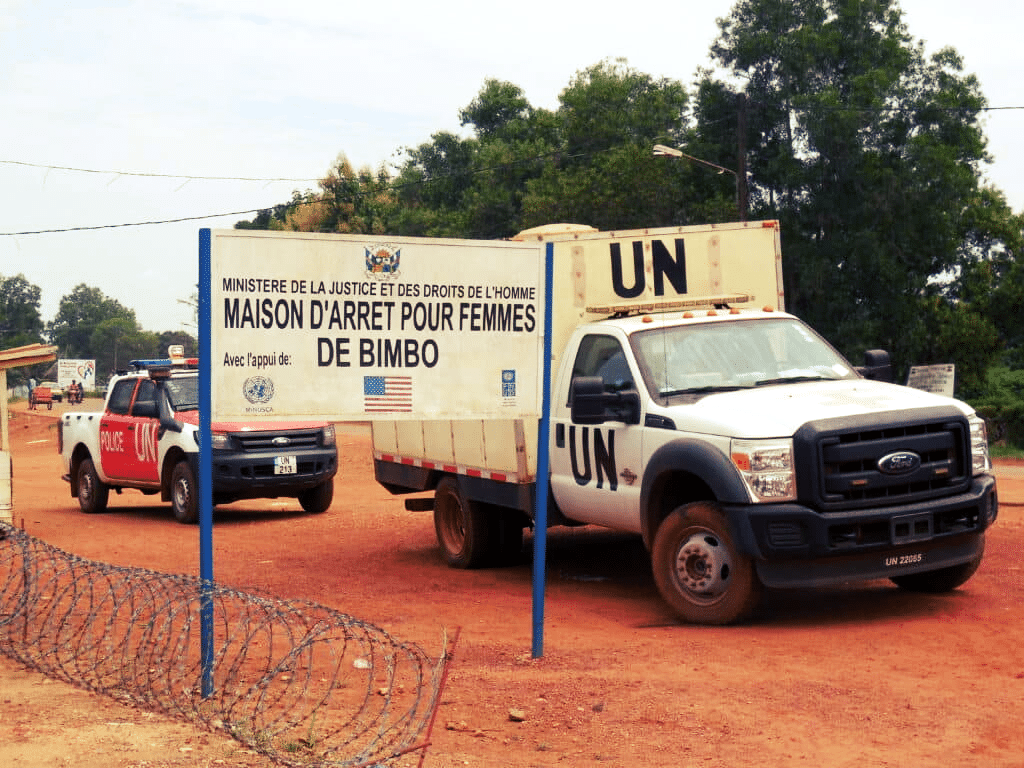
This article is part of ASF’s 2022 annual report.
Since 2015, ASF has paid particular attention to the issue of imprisonment in the Central African Republic (CAR). In partnership with the Bar Association, lawyers and civil society, ASF is raising awareness among detainees, monitoring detention conditions, offering legal services to detainees and lobbying to ensure that the justice reform (sectoral justice policy) initiated in the country is fully implemented. ASF is in dialogue with the Ministry of Justice, the prison administration, police forces, judges and lawyers to highlight the realities on the ground regarding detention issues.
In March 2022, ASF carried out a study looking in depth at the issues relating to detention in CAR. The report, “Les pratiques de privation de liberté en République centrafricaine, reflets d’une justice de crise et d’une justice en crise“, carried out with Inanga and with financial support from the European Union, points the finger at practices that criminalise poverty and an abusive use of preventive detention.
Although the CAR has a comparatively low rate of imprisonment, in recent years there has been an explosion in the number of people detained, particularly as a result of the increased use of pre-trial detention. More than 80% of inmates at Ngaragba, the country’s main prison, are awaiting trial. The prison, originally designed to hold a maximum of 400 people, currently has more than 1,400 inmates. Many of them are incarcerated in defiance of Central African and international standards.
The Central African Republic has been experiencing recurrent political and security crises for years. Against this backdrop, the State is attempting to reassert its presence and authority, and the judicial system seems to be used exclusively for repressive purposes, under pressure from the national authorities and international partners.
According to many actors, this crisis situation justifies crisis justice. Many of the people held in pre-trial detention are being prosecuted for offences directly related to the crisis, such as criminal conspiracy, breaches of state security, rebellion and possession of weapons. Their guilt is often presumed by the judges in charge of placing and keeping them in detention.
In a country that aspires to justice and where leaders consider the fight against impunity a priority, the use of pre-trial detention seems to be a practice that is rarely questioned. As one senior judge bitterly put it in the above-mentioned study, “it is better to lock up an innocent person than to let a criminal go free”. Fundamental legal principles such as the presumption of innocence and the right to a fair defence are often relegated to second place in favour of political considerations and the need to restore peace and social cohesion.
In June 2022, at a workshop organised under the aegis of the Ministry of Justice, the study was presented to all justice stakeholders.The event brought together senior magistrates, court presidents, judges and prosecutors, examining magistrates and lawyers, as well as representatives of international bodies such as United Nations agencies, the European Union and the United States, and international NGOs. The discussions led to a consensus on the seriousness of the situation and the findings reported by ASF and its partners.The participants agreed on a series of recommendations to be implemented as a matter of urgency.These recommendations include, for example, the need to deliver judicial decisions within shorter timeframes and to provide more training for prosecutors and examining magistrates in charge of following up detainees’ cases.
The issue of detention has become a priority for the Central African Ministry of Justice, as a result of highlighting detention conditions and reporting on the experiences of local players in the field. In October 2022, the General Inspectorate of Judicial Services was strengthened.It is now competent and equipped to act directly on detention issues.
In 2023, ASF will continue its work in partnership with local stakeholders, particularly judicial and penitentiary actors‧s, as well as its advocacy with the authorities so that the commitments made give rise to structural reforms offering lasting solutions to the problem of detention in CAR.



